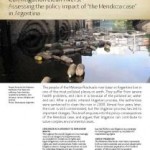Camila Gianella, Siri Gloppen and Elisabeth Fosse (2013)
in Journal of Human Rights Practice vol. 5 no. 1 pp. 153-176
Despite major developments to provide conceptual clarity to the legal enforcement of economic, social and cultural (ESC) rights, research analysing the processes of implementing court rulings and their actual impact is scarce, and there is a lack of consensus on the impacts of this kind of intervention on public policies, the plaintiffs, society, or on […]
Kavita Navlani Søreide (2013)
CMI Brief vol. 12 no. 4, 2nd edition
At the time of independence, India used protective law to address fears that its tribal majority regions would be marginalized vis-a-vis the larger, more developed states of the new nation. The ‘Sixth Schedule’ was written into the Indian Constitution to ensure rights of self-government for the tribal majorities in North Eastern Himalayas. This brief explores the context of the Sixth […]
Edited by Tina Søreide, University of Bergen, Norway and Aled Williams, Chr. Michelsen Ins tute (CMI), Bergen, Norway All societies develop their own norms about what is fair behaviour and what is not. Violations of these norms, including acts of corruption, can collectively be described as forms of ‘grabbing’. This unique volume addresses how grabbing […]
Siri Gloppen, Fidelis Edge Kanyongolo (2012)
in Danwood Chirwa, Lia Nijzink: Accountable Goverment in Africa. United Nations University Press
Varun Gari and Siri Gloppen (2012)
in Polity vol. 44 no. 4 pp. 485-503
This article aims to organize thinking around human rights-based approaches to development (HRBAs) and to review available empirical evidence regarding their benefits, risks, and limitations. We propose a typology distinguishing four types of rights-based approaches: global compliance based on international and regional treaties; human rights-based programming on the part of donors and governments; rights talk; […]
Siri Gloppen, Fidelis Edge Kanyongolo (2012)
in Danwood Chirwa, Lia Nijzink: Accountable Goverment in Africa. United Nations University Press
Varun Gari and Siri Gloppen (2012)
in Polity vol. 44 no. 4 pp. 485-503
This article aims to organize thinking around human rights-based approaches to development (HRBAs) and to review available empirical evidence regarding their benefits, risks, and limitations. We propose a typology distinguishing four types of rights-based approaches: global compliance based on international and regional treaties; human rights-based programming on the part of donors and governments; rights talk; […]
Kristi Staveland-Sæter (2012)
Bergen: Chr. Michelsen Institute (CMI Brief vol. 11 no. 3) 4 p.
The people of the Matanza-Riachuelo river basin in Argentina live in one of the most polluted places on earth. They suffer from severe health problems, and claim it is because of the polluted air, water and soil. After a public interest litigation process, the authorities were sentenced to clean the river in 2008. Almost four […]
Namita Wahi (2012)
Bergen: Chr. Michelsen Institute (CMI Brief vol. 11 no. 4) 4 p.
There is a healthcare crisis in India. Health indicators are dismal. 25% of the world’s maternal deaths every year, occur in India. 47% of all children in India are underweight. Health rights litigation has highlighted areas of dire need and provided a discursive space for petitioners and civil society groups to engage with government on […]
Camila Gianella (2011)
Bergen: Chr. Michelsen Institute (CMI Brief vol. 10 no. 7) 4 p.
Is right-to-health litigation a suitable strategy for advancing the right to health, or does it reinforce inequalities and undermine health authorities in their attempts to control costs and set fair priorities? Colombia has the highest number of right-to-health cases in the world. Its experiences illustrate how judicial claims can reflect structural problems of a health system. It also shows how, […]




